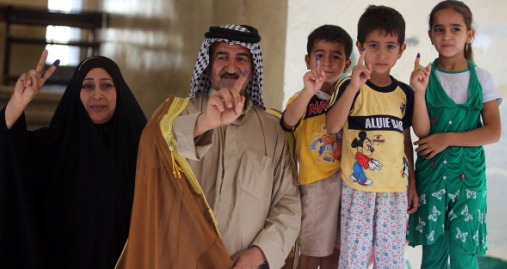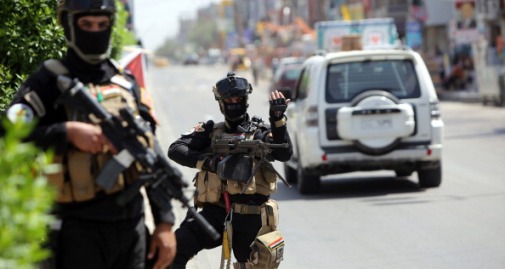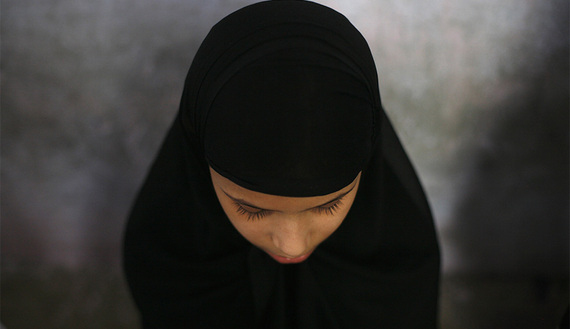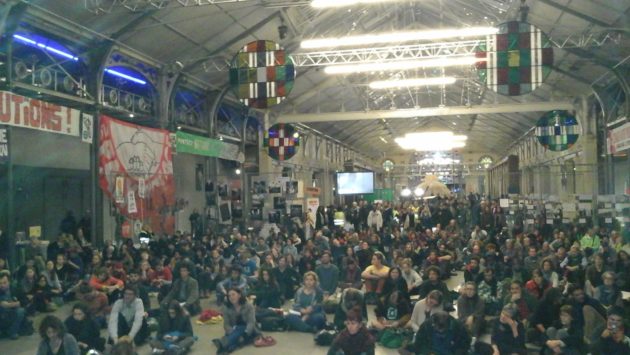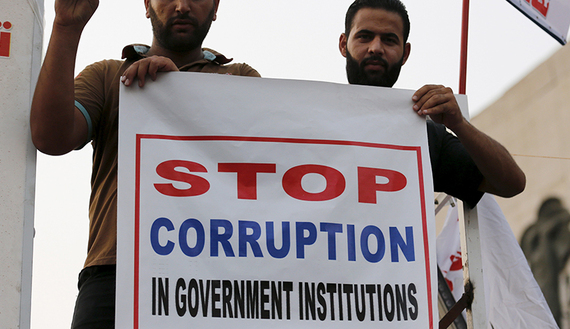Queues, Cyber Attacks, No Singing, Lots of Walking: Report From Iraqi Election Frontlines!
Source: Niqash
Niqash’s Iraqi editors covered their nation’s general elections from different ends of the country yesterday. Here they write about their experiences on the job on election day. As local media, they say it was difficult to cover the elections properly – let alone vote, in some cases, – because of official restrictions on what journalists could do. In Baghdad, they also did a lot of walking.
BAGHDAD: Here things were relatively calm, security was tight and many locals voted later in the day, to avoid potential extremist attacks.
By Kholoud Ramezi,
Early in the morning on election day in Baghdad, the streets were quiet. Most of the people I met on the street then, going to cast their votes early in the morning, were younger Iraqis. They were going to vote because they wanted to see a change in their country. There’s a ban on most cars in Baghdad today. Acurfew started on Tuesday night so almost everyone is having to walk to their nearest polling centre.
I walked with one young man, Ahmed Saadi, for a while. “I ate my breakfast, got changed and left the house with all my documents,” he told me. “And I’m heading for the school near my house. I’m going to vote for the same person I voted for, four years ago.”
Ahmed is walking to vote with his wife and his mother. When he returns home, his father will go to vote with Ahmed’s two sisters, later in the afternoon. The polling centre is in a school in Baghdad’s Amel neighbourhood. As we near the school we meet security personnel who are supervising entry into the school. Men are inspected by them and women are sent to a small room, with the door covered by a piece of cloth; there, two women search female voters.
During previous elections, local women would often do the zaghareet as they arrived – it’s a special tune, a traditional ululation, that’s used to express happiness and it’s often used at events like weddings. However that seems to have stopped now. Maybe it’s because these women have become more cynical – past elections do not seem to have brought any positive change to the country. On the other hand, the women coming to vote do seem a lot more confident about the procedure.
One of the voters approached the whole situation with a smile, cheerily greeting the security staff, as he arrived. He came out after voting and said in a loud voice: “Last year I was out of Baghdad and I couldn’t vote. Today I came to vote – I want to change the pictures of the people I see on TV every day, the people who do nothing other than make false promises and tell lies,” he declared.
Some of the staff at the centre allowed themselves to smile at his words. Others just looked stern.
Then one of the machines reading voter IDs crashed. It couldn’t read the information on the cards anymore. Luckily there was another device in the polling centre that was still working so they used that instead.
It’s not particularly easy for journalists to get in here. Members of the media need to be carrying their press card and other identification and getting into the polling centre takes a long time. In order to be allowed to stay here, I tell the security men I will just stand nearby and watch and I won’t ask anyone any questions.
There were police cars driving around the city that were helping the elderly, women and physically disabled people to get to their designated polling stations. After I left the first polling station, one of these picked me up and took me to another polling station, one where IHEC – Iraq’s Independent High Electoral Commission – had ruled that media were allowed to enter and cover the process.
Everything was calm here. The only disruptive thing that happened was one young child crying loudly when he saw his mother dipping her finger into the special ink, that designated that somebody had voted already. “I want to dip my finger in ink too,” the child yelled. A polling centre staff member then coloured his finger with ink too.
After midday, Baghdad’s streets got busier. Voters are afraid that polling centres will be attacked and that’s why they prefer to leave their houses later on – they hope that whatever is going to happen, will have happened already. Additionally the curfew was partially lifted, two hours before the close of voting. That saw a lot of people start using their own cars to get to the polling stations – especially when their designated stations were far from their own homes.
I met Abu Jalal’s family doing exactly this as I returned home in the afternoon. They were heading to northern Baghdad in their own car to vote at a polling station there.
“Our ration cards were issued there,” explained Abu Jalal, hurriedly. “So we vote there. And every election, we go after the curfew is lifted because if we went on foot, it would take three or four hours.”
Abu Jalal and his family sped off and my mobile phone rings. It is one of my colleagues, another journalist. His first question: “Did you actually vote?”
“No, I didn’t,” I answered, and explained that the two polling centres open to voters from the media were a long way away. “Instead I spent the whole day walking from polling station to polling station,” I told him. “Did you vote?”
“No,” he replied. “And for exactly the same reason.”
IRAQI KURDISTAN: Some of the biggest problems here were digital as campaign and news websites went down in a suspected hacker attack; so for the first time Kurdish voters and campaigners started using Facebook in a concerted way.
By Zanko Ahmad,
On election day, a lot of my colleagues in the media were in a rush to reach polling stations in Iraqi Kurdistan where the leaders of the various political parties were voting, or where celebrities were casting their ballots. A lot of the political party leaders voted early in the morning, as balloting was just starting, so that they could be seen on television and then urge their supporters to go and vote for them.
Along with two other journalists, I also decided to cast my own vote early – we all thought that local politicians might start broadcasting new messages about the election, saying things they had not said before, and we wanted to get the breaking news if there was some.
During the morning, most of the polling stations – including the one we went to vote at – were pretty empty. And even though there were not many locals around yet casting their ballots, the process was already very slow. The newly introduced electronic scanners, which were supposed to be used with electronic voter ID cards, did not seem to be able to read the voter fingerprints properly. This caused delays for locals and staff at the polling centres.
Back outside the polling centres, election campaigning was still going on – that’s even though the election rules say it was supposed to stop 24 hours before people voted. Representatives of various different political parties stood outside the polling centres distributing promotional material in support of their candidates and their lists.
After voting ourselves, we made our way to the polling stations that were allowing media coverage. After a decision by IHEC, there were only five such centres in the whole region. IHEC said it made this decision in order to streamline the voting process. A lot of local journalists complained that this prevented them from covering the election freely, saying, among other things, that they couldn’t get to all the allocated polling centres.
Another big problem for local media were cyber attacks directed at several news websites as well as the website run by one of the leading political parties, the Change movement.
So the journalists who usually contribute to these websites started to use Facebook. This was a real development – social media became the main arena for political competition and debate, with some Facebook users from Iraqi Kurdistan posting pictures of their ballot papers.
Mobile phone use was not prohibited inside polling centres so voters took pictures of their ballot papers after marking them. They then posted these online, with slogans like: “I voted. Go and vote too”. Usually these exhortations were accompanied by enthusiasm for the users’ party of choice.
Although apparently some scuffles broke out between supporters of different parties in some places, on the whole, we didn’t notice any major problems during election day in Iraqi Kurdistan. Having said that, plenty of complaints started to be filed after voting closed at 6pm. No doubt we’ll be investigating these in later stories.
This was also when supporters from many different political parties started to celebrate on the street. One of the traditions for celebration here is to fire your weapons into the air. Now that the elections were over, the main concern of many voters here was not to get hit by a stray bullet, or to have their property damaged by one.
BERLIN: In the German capital, where Niqash’s administrative offices are based, we monitored Western media coverage of the elections.
By Cathrin Schaer,
According to a lot of the Western media, Iraq’s general election yesterday took place in an almost-apocalyptic setting. Sectarian divides would worsen, bombs were going off left, right and centre and the country was either on the verge of breaking up, of civil war or about to be taken over by Al Qaeda – ormaybe Iran. 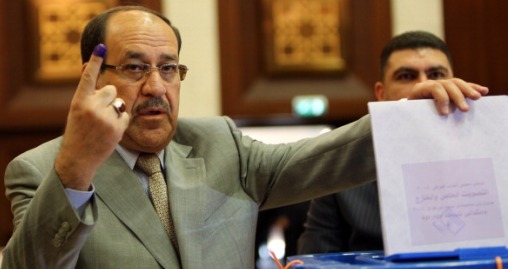
There were however some long time Iraqi observers who did occasionally manage to sound optimistic. Well, cautiously optimistic anyway.
So where did the truth lie in most English-language media reporting on the elections? Where the truth always lies – somewhere in the middle, most likely. If you were sitting in Niqash’s office in central Europe yesterday, as elections were held in Iraq, it seemed that how you saw the situation all depended on how optimistic or pessimistic you happened to be, or which publication you were reading.
It is true that over the past eight years, Iraq’s incumbent Prime Minister, Nouri al-Maliki, has done an awful lot of things that make it look as though he would like to consolidate political power under one roof: his own. Even his own allies – now mostly former allies – have described him as a dictator at worst, and authoritarian at best. It is also true that parts of Anbar province, in Iraq’s west and mostly populated by the country’s Sunni Muslims, are currently a violent mess – although they are far from being taken over by any single armed extremist group. It is also true that many Sunni Muslims in those areas would not have been able to vote yesterday – which leaves out a big segment of the population. And that extremist groups are killing increasing numbers of Iraqi civilians on an ongoing basis.
But it is also a fact that, as seasoned political analysts like Reidar Visser have pointed out there are alsosome positive things going on inside of Iraq’s political tangle. After months of cricising him, Al-Maliki’s own significant same-sect allies have more or less deserted him to campaign on their own, motivated by what they see as his mismanagement of the country. The leader of one of the major Shiite Muslim parties, the Citizen coalition, led by the Islamic Supreme Council of Iraq, recently said his party was more interested in campaigning on an anti-corruption platform; this year, this religion-based party is also fielding secular-style candidates, including academics and unveiled female politicians. And in other hopeful signs, after the last provincial elections, held in early 2013, several major Shiite Muslim parties went on to form alliances with Sunni Muslim and Kurdish politicians.
All of which would appear to indicate that Iraqi politicians’ deeds are becoming marginally more important than – or perhaps – as important as their religious affiliations.
As Visser wrote for Foreign Affairs magazine: “Despite the population’s deep divides, Iraqi politics have refused to play by the old sectarian rules. In fact, most long-standing ethno-sectarian parties have fractured and, in some cases, key political issues are starting to cut across religious identities.”
“Security and local identity are dominant themes in the 2014 elections,” Ahmed Ali, Iraqi analyst at the Washington-based think tank, Institute for the Study of War, argues in a brief released the day after the elections. “This is a stark contrast to Iraq’s 2010 elections, which primarily involved strategies of ethno-sectarian unity.”
In a piece in the Christian Science Monitor, titled: “Politics Could Be The Solution, Not The Problem”, Middle Eastern correspondent Dan Murphy writes that: “what’s happening in Iraq at the moment is not some atavistic expression of ‘ancient’ hatreds and irreconcilable cultural differences. Instead, it’s a function of the failure of politics and power sharing in the modern era”. And because politics is to blame, he argues, politics could also be the answer – if Iraq’s leaders can manage to change.
There are no exit polls in Iraq so it’s hard to know whether these small hopeful signs also translate to decisions Iraqi voters made yesterday. Maybe, as many Western reporters seem to think, they’ll fall for al-Maliki’s “strong leader against terrorism” spiel.
Anecdotally though, most middle class Iraqis do seem to want to live in peace with their neighbours, after all these years of terror and violence. They want to earn a decent living, to educate their children, to get more than a few hours of electricity a day when temperatures soar and not to have to worry about car bombs every time they go out shopping. They would like to see the country’s burgeoning oil revenues impact meaningfully on their daily lives. And no matter what sect they come from, they most likely also know that this last government has not brought them any closer to any of that.
The other thing worth considering is that, although Iraq is still a dangerous and in many ways, conservative, place for journalists, it is also possible to express opinions there now in ways that would have been unthinkable a few years ago.
As journalists ourselves, we know that a nuanced view of Iraq’s election politics, that reflects both the positive and negative, cannot ever be expressed in one headline – after all, there’s not much room in a headline. And we know it will take time – after all, democracy (if we can call it that) is a process. But we hope that in the days and months to come, with all the political wrangling that the election results will doubtless entail, that those small, marginal signs of hope may eventually evolve to become the bigger headlines about Iraq.

